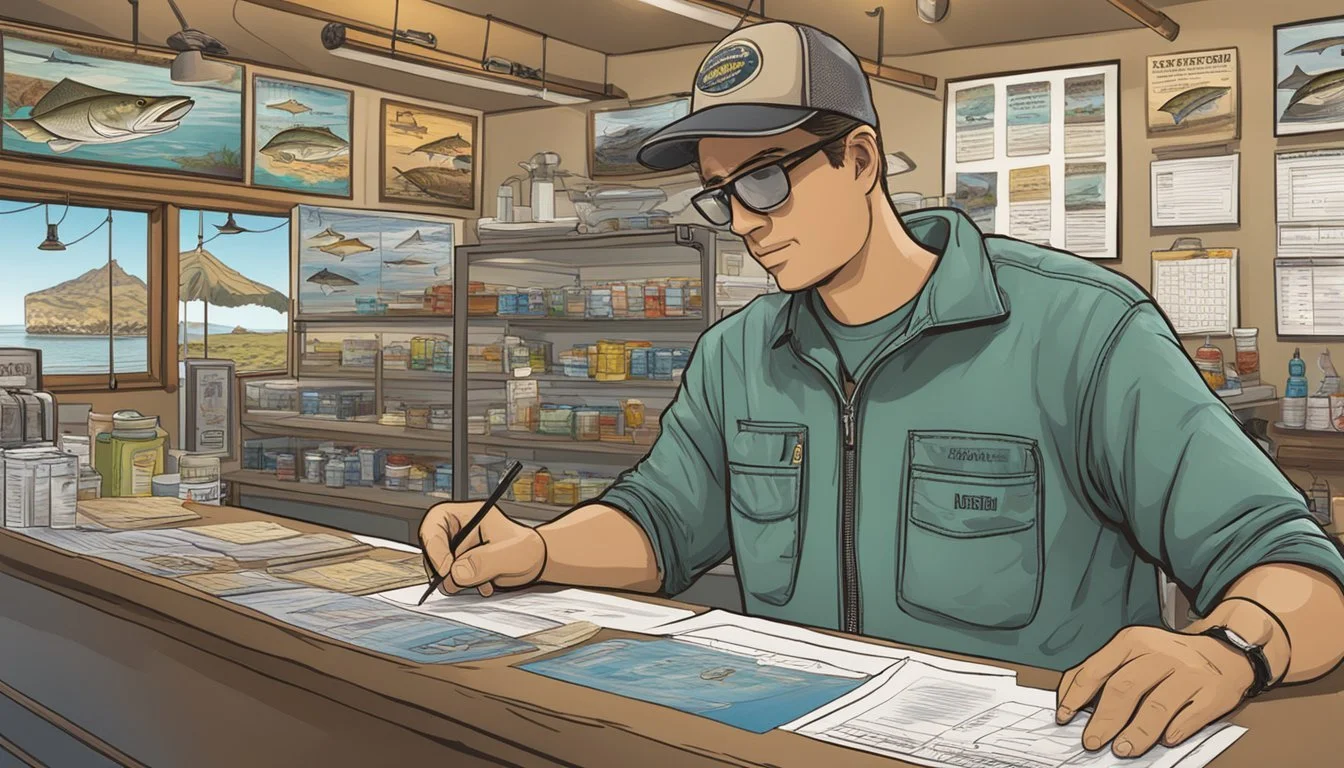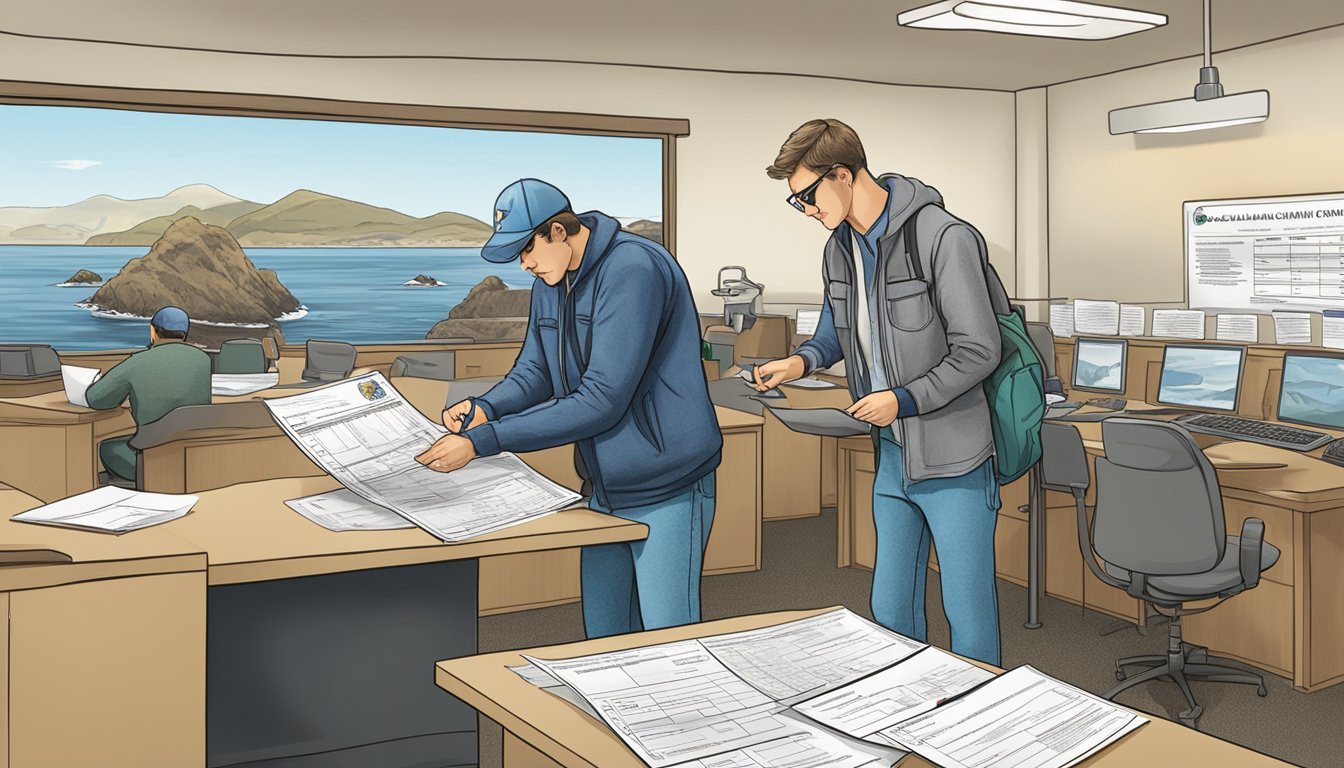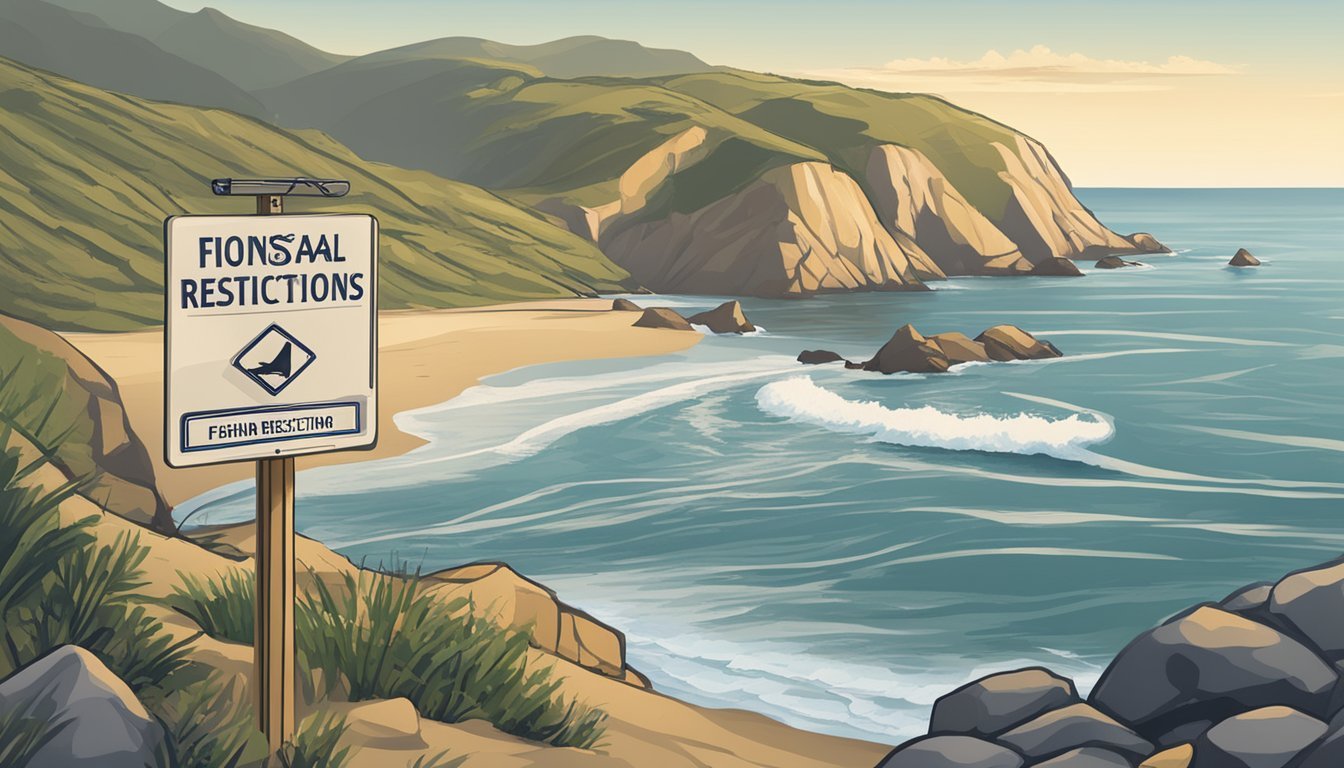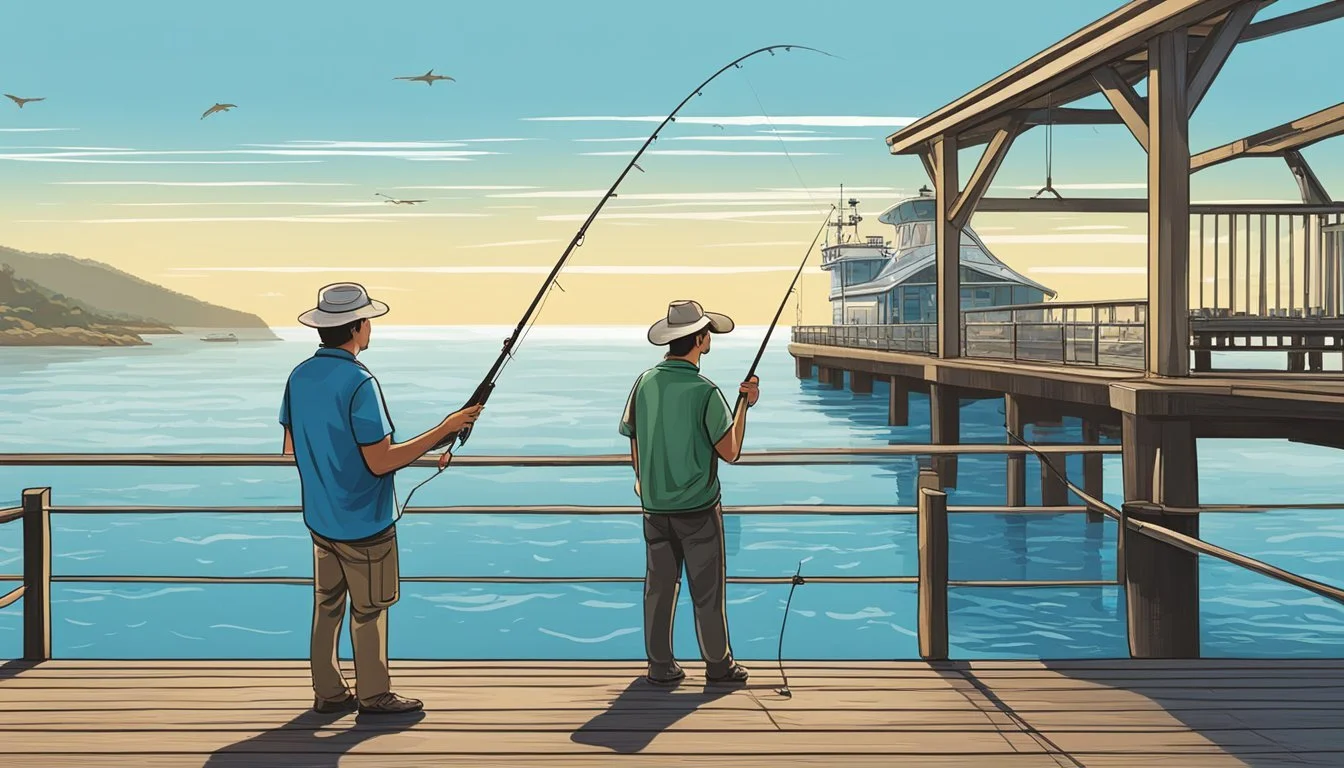How to Get a California Saltwater Fishing License
Your Easy Step-by-Step Guide
Anglers aiming to enjoy the diverse and rich saltwater fisheries of California are required to obtain a fishing license. This mandate applies to anyone 16 years of age or older, whether they are residents of the state or non-residents, and extends to various fishing environments, including ocean fishing from a boat or shoreline and bay fishing.
Purchasing a California fishing license can be conveniently accomplished online through the California Department of Fish (What wine goes well with fish?) and Wildlife's (CDFW) website or in person at a licensed agent or at a CDFW license sales office. CDFW offers different types of licenses such as annual, one-day, and short-term licenses tailored to fit the needs of various fishing trip durations and preferences.
It's important for anglers to be aware of the regulations and guidelines associated with saltwater fishing in California to ensure the protection and sustainability of marine habitats and species. Compliance with size and bag limits, as well as the understanding of season closures and protected areas, is essential for a responsible and enjoyable fishing experience.
Eligibility Criteria
In California, the saltwater fishing license is a must for anglers aiming to fish in marine waters. Eligibility varies based on residency status and individual circumstances, including provisions for special licenses.
Residents
Residents are defined as individuals who have resided in California continuously for at least six months prior to the application date for the license. They must provide identification and proof of residency when applying. Residents include:
Adults (ages 16 and older)
Low-income seniors (over 65 years old)
Blind, developmentally disabled, or mobility-impaired individuals
Disabled veterans
Residents have the option to purchase annual or short-term licenses, as well as lifetime fishing licenses, which provide a lifetime of sport fishing without the need for annual renewals.
Non-Residents
Non-Residents are those who do not meet the residency requirements. These anglers can still obtain a license to fish in Californian waters but may be subject to different fees than residents. Non-residents can purchase:
Annual non-resident licenses
Short-term licenses for specific durations
Individuals from neighboring states who wish to fish in shared waters such as Lake Tahoe or Topaz Lake must adhere to the regulations imposed by California and may require a valid Californian sport fishing license.
Special Licenses
Special licenses are available for various groups:
Low-Income Seniors: Residents over 65 with limited income quality for reduced-fee licenses.
Blind, Developmentally Disabled, Mobility Impaired: These groups may be eligible for Free Sport Fishing Licenses if they meet the criteria set by the California Department of Fish and Wildlife.
Disabled Veterans may also qualify for reduced-fee or free licenses depending on their disability rating.
To summarize, eligibility for a California saltwater fishing license is primarily determined by residency status and individual circumstances, with special provisions for seniors, disabled individuals, and veterans designed to accommodate a wide range of anglers.
Types of Saltwater Licenses
California offers various saltwater fishing licenses to suit the needs of both resident and non-resident anglers. From annual to short-term and even lifetime options, California's license variety accommodates varied fishing commitments and preferences.
Annual License
The Annual Sport Fishing License is valid for 365 days from the date of purchase, rather than the calendar year. It allows the holder to fish in both freshwater and saltwater. Additional tags and report cards may be necessary for certain species and areas.
Short-Term Licenses
For short-term needs, there are two options: a Two-Day Sport Fishing License and a 10-Day Non-Resident Sport Fishing License. These are ideal for tourists or casual fishers who do not require an annual pass.
Lifetime Licenses
Lifetime Fishing Licenses are available for avid anglers who wish to make a one-time purchase for fishing privileges that last a lifetime. They come with a fishing privilege package, ensuring the licensee is covered without the need for an annual renewal. Lifetime licenses are a cost-effective option for those who fish frequently over many years.
How to Purchase
Purchasing a California saltwater fishing license is a straightforward process that can be accomplished online, through local license agents, or directly at California Department of Fish and Wildlife (CDFW) license sales offices.
Online Purchasing
Individuals can obtain their saltwater fishing licenses online through the official California Department of Fish and Wildlife website or other approved electronic licensing systems. Online purchases require a Visa or MasterCard for payment. The online service facilitates different types of fishing licenses, from short-term to an annual license. Online purchasing is a convenient option for those who prefer to secure their permit promptly and from any location.
Local License Agents
Many local businesses are authorized as license agents where anglers can buy their fishing licenses in person. These include outdoor and sporting goods stores, such as Walmart and Big 5 Sporting Goods, as well as local tackle shops. When visiting a local license agent, payment can be made via credit card, check, or money order. These agents are available throughout California, providing an accessible option for individuals to purchase their fishing licenses.
CDFW License Sales Offices
For those who prefer to purchase their licenses in person or need assistance, CDFW license sales offices are available. However, these offices do not accept cash payments. Here, applicants can receive direct support and answers to their questions regarding permits and licenses. Licenses obtained at CDFW sales offices include the same variety of terms, from daily to yearly licenses, as online or at local agents.
Understanding Compliance
It is essential for individuals planning to engage in saltwater fishing in California to understand and comply with the state's regulations. These rules are established by the California Department of Fish and Wildlife (CDFW) to maintain marine life's sustainability and health.
Regulations and Validations
California fishing regulations are structured to protect various species and environments, requiring anglers to abide by specific rules while fishing in saltwater. Sport fishing validations are mandatory additions to the basic fishing license and are enforced to regulate the fishing of particular species and in designated areas. For example, the Ocean Enhancement Validation is required for anglers fishing in the ocean south of Point Arguello in Santa Barbara County.
Additionally, special validations like the Second Rod Validation are available, which allow the use of two rods in inland waters where regulations permit. It is imperative that anglers keep abreast of these rules, which can be found in the official regulations or directly through the CDFW.
Report Cards and Tags
The CDFW mandates the use of report cards for certain species and areas to monitor and manage fish populations effectively. For instance, anyone targeting sturgeon must have a Sturgeon Fishing Report Card and complete a Sturgeon Fishing Report Card Affidavit if they catch a sturgeon. Similarly, report cards are required for other species, like steelhead, abalone, and for those fishing in the Klamath and Trinity rivers.
Report cards are instrumental in collecting catch data, which supports the conservation efforts of the CDFW. For recreational crab (how long does crab last?) trappers, the Recreational Crab Trap Validation is necessary. Following these protocols is critical for maintaining privileges to fish in California waters and to support long-term conservation.
Fishing Zones and Restrictions
Understanding California's fishing zones and restrictions is critical for any angler looking to fish in the state's diverse waters. Compliance with regulations is mandatory to preserve marine life and environments, and to avoid fines.
Inland Waters
Inland waters in California are defined as all freshwater areas, which include lakes, rivers, streams, and reservoirs. Sport fishing licenses are required for anyone wishing to fish in these areas. Inland waters may have specific seasonal closures, gear restrictions, and bag limits. For example, some rivers, like the Smith Rivers, stipulate the use of barbless hooks and artificial lures only, to protect native fish stocks.
Coastal and Ocean Waters
Coastal and ocean waters refer to the saltwater environments that extend from the shore out into the Pacific Ocean. From Point Arguello south to the border with Mexico near San Diego, anglers can explore an array of fishing opportunities. A sport fishing license is generally required unless fishing from public piers, where no sport license is needed. However, all anglers must abide by the fishing season dates, and size and creel limits. Specific gear restrictions apply to certain species such as sturgeon or spiny lobster, where special gear like traps may be used under regulated conditions.
Protected Species and Areas
California designates certain species and areas as protected, ensuring their sustainability. Areas like the Marine Protected Areas (MPAs) restrict certain fishing activities, and species such as abalone have been subject to moratoriums due to conservation needs. Anglers must be aware of these restrictions as they vary by region and species. Violation of these regulations can result in fines and other penalties. It's critical for fishermen to check current regulations regularly, as they are subject to change.
Additional Information
This section provides supplemental details about California saltwater fishing licenses to enhance an angler's understanding and ensure they remain compliant with state regulations.
Free Fishing Days
In the state of California, the Department of Fish and Wildlife designates two Free Fishing Days annually. On these days, any individual may fish without a sport fishing license, providing a great opportunity for recreational anglers to experience fishing or introduce the sport to a new enthusiast.
Frequently Asked Questions
Q: Do both residents and non-residents need a California fishing license? A: Yes, anyone aged 16 or older, including both residents and non-residents, must obtain a California fishing license to fish in the state's marine waters.
Q: Can hunting licenses also be purchased online? A: Similar to fishing licenses, hunting licenses can be purchased online through the California Department of Fish and Wildlife website or from authorized license agents.
Duplicate Licenses and Validations
In the event that a recreational angler's sport fishing license is lost or destroyed, they can request a duplicate from the California Department of Fish and Wildlife. A nominal fee is charged for the issuance of a duplicate license. License validations, which are often species-specific or area-specific, may also be required and are available for purchase along with the primary sport fishing license.
Resources and Contacts
For those looking to obtain a California saltwater fishing license, there are several resources and contacts available to provide assistance throughout the process.
California Department of Fish and Wildlife (CDFW):
The primary resource for obtaining a fishing license is the CDFW. They offer a range of licensing options tailored for both residents and non-residents, including short-term and annual licenses.
Website for Online Purchases:
For online license purchases, visit the official CDFW website: California Department of Fish and Wildlife LicensingLicense Sales Offices and Authorized Agents:
Licenses can also be purchased at license sales offices or through authorized license agents throughout the state. A list of locations is available on the CDFW website.Telephone Sales:
To buy a license over the phone, contact the CDFW’s sales line at:
(800) 565-1458
Customer Service:
For inquiries or assistance, the CDFW offers customer support:
General Information Phone:
(800) 565-1458CDFW License and Revenue Branch:
For customers seeking direct support or with specific licensing questions.
When contacting the department or purchasing licenses through any of these channels, individuals must have pertinent identification and payment details ready. The CDFW does not accept cash at its License and Revenue Branch and regional license counters.
For a stress-free process, the CDFW’s digital services allow anglers to easily obtain a license from the comfort of home, ensuring they are legally prepared for their saltwater fishing adventures in California.
Conclusion
Acquiring a saltwater fishing license in California is a clear process. Residents and non-residents need to ensure they have the appropriate license for their fishing activities. Public piers offer the opportunity to fish without a license, and the state also designates Free Fishing Days during the year where a license is not required.
Fees vary depending on the type of the license and the duration for which it is valid, such as:
One-day
Annual
10-Day licenses
Children under 16 are exempt from needing a license but may be required to obtain a report card for certain species.
Purchasing a license can easily be done online or at licensed agents, providing convenience and flexibility for anglers. It's essential to remain informed about the regulations to avoid penalties, since fines for violations can be significant.
Having a fishing license not only complies with the law but also contributes to the conservation and maintenance of the state's marine and freshwater fisheries.
By complying with these guidelines, anglers help ensure the long-term sustainability of fish populations, contributing to the health of California's diverse aquatic ecosystems. It's an act of responsibility and respect towards the environment and the recreational pursuit enjoyed by so many.








